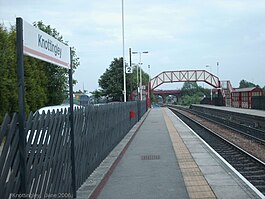Knottingley railway station
| Knottingley |
|
|---|---|

Platform 2
|
|
| Location | |
| Place | Knottingley |
| Local authority | City of Wakefield |
| Coordinates | 53°42′23″N 1°15′32″W / 53.7065°N 1.2590°WCoordinates: 53°42′23″N 1°15′32″W / 53.7065°N 1.2590°W |
| Grid reference | SE490235 |
| Operations | |
| Station code | KNO |
| Managed by | Northern |
| Number of platforms | 2 |
| DfT category | F1 |
| Live arrivals/departures, station information and onward connections from National Rail Enquiries |
|
| Annual rail passenger usage* | |
| 2011/12 |
|
| 2012/13 |
|
| 2013/14 |
|
| 2014/15 |
|
| 2015/16 |
|
| Passenger Transport Executive | |
| PTE | West Yorkshire Metro |
| Zone | 3 |
| History | |
| Key dates | Opened April 1848 |
| National Rail – UK railway stations | |
| * Annual estimated passenger usage based on sales of tickets in stated financial year(s) which end or originate at Knottingley from Office of Rail and Road statistics. Methodology may vary year on year. | |
|
|
|
Knottingley railway station serves the town of Knottingley in West Yorkshire, England. It lies on the Pontefract Line, operated by Northern, and is 16 miles (26 km) south east of Leeds railway station.
The station is the final one in West Yorkshire before the North Yorkshire border and most services terminate (or start) there.
The station was constructed by the Wakefield, Pontefract & Goole Railway as part of their main line from Wakefield to Goole, which opened in April 1848. It was not long though before it became a busy junction, as within two years links to Doncaster via the Askern branch (on 6 June 1848), Leeds via Castleford and Methley Junction (1 December 1849) and York via Ferrybridge and Burton Salmon (1 August 1850) had all been opened. The first of those was jointly built and operated by the Lancashire and Yorkshire Railway and Great Northern Railway and the station also became jointly managed by these two companies in 1854. The Great Northern made use of its running powers and traffic agreements with the LYR to run through trains from Doncaster to both Leeds and York, putting the town on a new main line between London & York for a number of years until shorter, more direct lines could be constructed.
By 1871 the station had lost its trunk line status with the opening of new lines from Doncaster via Wakefield (to Leeds) & Selby (to York), but it still handled plenty of local passenger and freight traffic (particularly coal from a large number of collieries in the area).
...
Wikipedia
